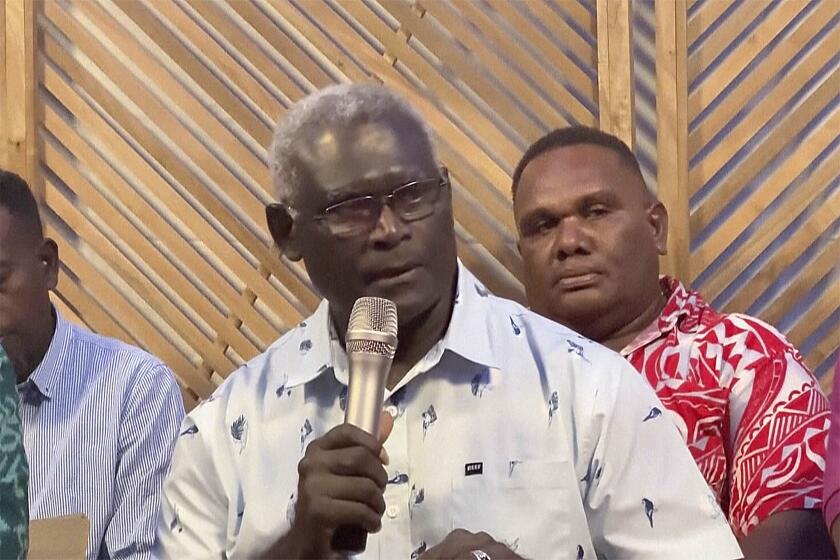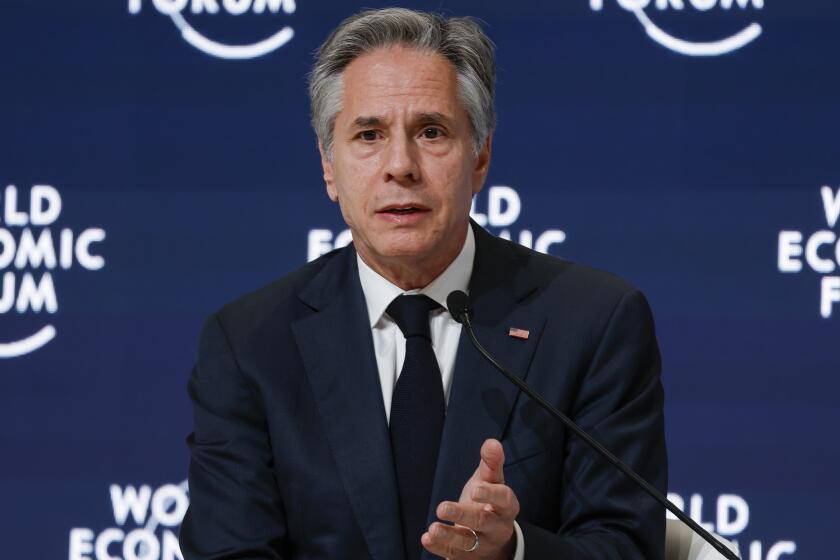Advisor Cites Conflict Potential
Retired Texas oil executive Philip J. Carroll, the Pentagon’s hand-picked advisor overseeing the reconstruction of Iraq’s oil industry, acknowledged Thursday that he faces potential conflicts of interest because of his financial holdings in U.S. companies planning to bid on Iraqi oil contracts.
“Absolutely,” he said of potential conflicts during a wide-ranging interview with The Los Angeles Times, a week into his job as senior advisor to an emerging Iraqi Oil Ministry.
Carroll, however, said he will attempt to avoid any conflicts by distancing himself from the oil contracting process. He also has declared to the Defense Department all of his financial holdings in companies that may seek a role in rebuilding Iraq, he said.
“I know at this stage of my life I don’t want my reputation tarnished,” said the 65-year-old Houston resident. “And I will stay so far away from any consideration of the bidding process, evaluation process or even the administration and arbitration of things associated with any of those companies in which I have a financial interest.... Believe me, I will have absolutely nothing to do with it.”
Carroll also vowed that he will not advise Iraqis to privatize their oil industry. Rather, he will present an array of alternatives, including continuation of the 100% state-owned system in place during the regime of Saddam Hussein.
“I would not be surprised if they pick something other than the American model,” said Carroll, 65, who retired a year ago from Aliso Viejo-based Fluor Corp., an engineering and construction firm. “If they did pick that [American model], it might be a wonderful thing in some people’s eyes. It probably would not be a wonderful thing in everyone in Iraq’s eyes.”
Even after a 32-year career with Shell Oil Co. in Texas, where he retired as its chief executive, and four years as head of Fluor, Carroll sounds like an advocate for keeping Iraqi oil as a national industry.
“You have to realize that oil occupies a very important and unique place in the minds of the Iraqi people. It constitutes the overwhelming, dominant economic force in the country,” he said. “It provides the wherewithal of building a better life for the Iraqis.
“There are also feelings throughout the population that oil represents, in essence, the national heritage of Iraq.”
Documents on file with the Securities and Exchange Commission show that Carroll continues to receive more than $1 million a year from Fluor in retirement benefits and bonuses pegged to the company’s performance. He also owns about 1 million shares of the company’s stock, according to its latest proxy statement. Fluor has said it plans to bid on a U.S. Army Corps of Engineers contract to rebuild Iraq’s oil industry.
But, in a cavernous foyer of the former palace that houses the Pentagon agency set up to rebuild Iraq -- below former offices of Hussein’s inner circle where Carroll and others sleep in simple dormitory beds -- the white-haired former executive insisted that his personal financial interests will not influence his work here.
“You have to, first of all, have a good sense of yourself not to do anything that even has the appearance of wrongdoing, and you have to rely on the general counsel at the Department of Defense [saying], ‘Ah, you can’t go there. Stay away from that.’ You try to build a wall around you.
“I recognize that there will be undoubtedly someone who will at some point say, ‘Aha!’ ” he added. But money “is the farthest thing from my mind.”
Carroll said he began working for the Pentagon last fall, developing contingency plans for Iraq’s oil sector in the event of war. He assumed his work was completed, he said, until Defense Secretary Donald H. Rumsfeld called him shortly after the U.S.-led invasion began and offered him the oil advisor’s job.
“My response was, ‘Well, this is not high on my hit parade list right now,’ ” Carroll said. “But under the circumstances, you just can’t say no.”
The former Laguna Beach resident said his most immediate concern is the oil crisis paralyzing a nation that owns an estimated 112 billion barrels of oil, reserves that are second only to those of Saudi Arabia. He said that he and the hand-picked Iraqis serving with him will ease the shortages of gasoline and natural gas by June 1, along with the mile-long lines at the gasoline pumps that have tormented Iraqis since the war ended.
Carroll said the U.S.-led coalition running Iraq is trading some of the massive stocks of fuel oil and diesel that are clogging Iraq’s pipelines and storage tanks for Kuwaiti gasoline and natural gas.
Since the invasion in March, clogged oil pipelines have forced Iraq’s refineries to produce only limited quantities of gasoline. The process generates fuel oil and diesel, which the refineries have no place to store.
But Carroll conceded that the barter arrangements with Kuwait and other countries in the region are stop-gap measures.
The longer-term solution lies in the Bush administration’s call to lift the U.N. sanctions that prevent the export of Iraqi oil, Carroll said. Only by exporting crude oil can Iraq clear its congested pipelines and refine the quantities of crude needed to produce natural gas, he and several Iraqi oil engineers said.
“I think it is almost unconscionable not to let the people of Iraq at this critical point in time gain the benefit of their largest source of wealth to help them reconstruct this country,” Carroll said. “I think it is absolutely imperative that the United Nations lift those sanctions and let the Iraqi people help themselves.”
Once the sanctions are lifted, Carroll said, oil exports could begin in about two weeks. The positive effect would be felt at gasoline pumps throughout Iraq in a month or so, he added.
In rebuilding the oil ministry, Carroll has selected as the nation’s new acting oil minister Thamir Ghadhban, who was the ministry’s director of planning under Hussein. Carroll also has tapped for his advisory board Iraqi exile Fadhil Othman, a former director of the state oil company’s marketing office who left the ministry and the country decades ago for Turkey, where he has worked as a private consultant to major oil companies worldwide.
But the oil ministry itself remains at skeleton-staff strength, and Carroll brushed back concerns of independent energy analysts who say customers may be reluctant to sign contracts to buy Iraqi crude because, with a new government and the coalition occupying the country, ownership of the oil is unclear.
“I think the ownership of the oil is quite clear. It is owned by the nation of Iraq,” he said. Even without a government, he added, “It is still a nation.... It still has ownership of the oil. “
Asked where the revenue from such oil sales would go, he replied: “So long as the coalition forces are in a position of administration, it will go into the equivalent of a trust fund, which will be devoted solely to reconstruction and humanitarian relief for Iraq. Not one penny of it will be used for any other purpose, I can assure you of that.”
The aspirations of the Iraqis themselves, after a quarter of a century of a dictatorship that sought to harness Iraqi and Arab nationalism to remain in power, dominated Carroll’s remarks.
“You clearly can have certain ideas about what you think is the most efficient economic model to use to structure the industry, but you have to factor in national aspirations and politics and all the rest of it,” Carroll said.
“And so I think the answer ultimately is these things will be decided by the Iraqi people and the Iraqi government. We can help at least frame the options and to help the Iraqi oil people be able to analyze those and to present them to the new government in a way that hopefully would be the best choice, and it would be a choice for Iraq.”
More to Read
Start your day right
Sign up for Essential California for news, features and recommendations from the L.A. Times and beyond in your inbox six days a week.
You may occasionally receive promotional content from the Los Angeles Times.






